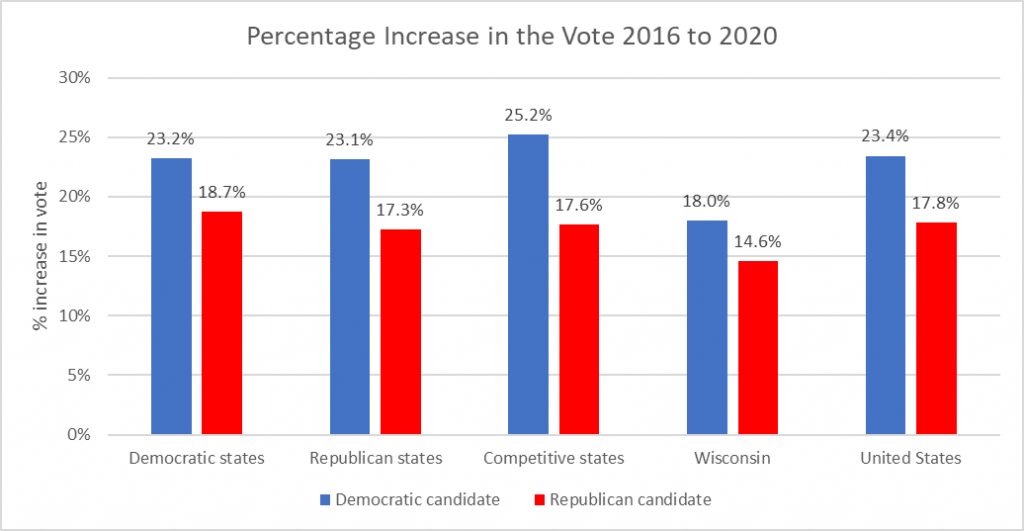About That Recall Effort Against Robin Vos
The campaign by Vos haters is anti-democratic. Here's why.

Assembly Speaker Robin Vos. File photo by Coburn Dukehart/Wisconsin Center for Investigative Journalism.
There is little question that Robin Vos, the Speaker of the Wisconsin Assembly, is a partisan Republican. The media routinely describe him as “the most effective Republican in the GOP-controlled state Legislature.” Why, then, is a group of Racine County Republicans trying to remove him from office?
Vos’ crime, in the eyes of his critics, is that he is not sufficiently loyal to former president Donald Trump. This is reflected in his skepticism towards the theory that Trump won the 2020 presidential election rather than Joe Biden. There are numerous reasons to conclude that Trump lies when he claims he won the election.
To me, one of the most convincing proofs of the lack of fraud is the similarity of voting patterns in five competitive states–Arizona, Georgia, Michigan, Pennsylvania, and Wisconsin—with those of the rest of the states. Almost everywhere the story was the same—both candidates received more votes in 2020 than In 2016. However, this increase was greater for Biden than Trump.
The chart below illustrates this effect for states that supported the Democrat in both years, those that supported the Republican, the states that switched from Republican to Democrat, Wisconsin, and the whole nation. The five switchers did not switch because of an unusual (and suspect) surge of votes for Biden. They switched because their parties were so close to the line that Biden’s increase pushed them over the line.
Despite the lack of evidence for Trump’s election fraud claims, Republicans like Vos who deny it do so at their peril. Consider the fate of the 10 Republican US House members who voted to impeach Trump following his incitement of the January 6th insurrection:
- Of the 10, four retired: Fred Upton (MI), Adam Kinzinger (IL), John Katko (NY), and Anthony Gonzalez (OH). Kinzinger served on the House committee investigating the insurrection. Gonzalez is quoted as blaming threats to his family for his decision to step down.
- Four ran for another term, but were defeated in the Republican primary: Liz Cheney (WY), Jaime Herrera Beutler (WA), Peter Meijer (MI), and Tom Rice (SC). Cheney also served on the committee investigating the insurrection. The Republican primary victors who defeated Herrera Beutler and Meijer were in turn defeated in the general election by their Democratic opponents, ironically flipping those two seats from Republican to Democratic.
- Two were successful in being re-elected: Dan Newhouse (WA) and David Valadao (CA). Notably, these two states have replaced their partisan primary with a nonpartisan primary in which every candidate, regardless of party, can participate. The top two candidates go on to the general election.
So, the threat to Vos from Trump and his more doctrinaire supporters is a real one. In this environment, Vos’ decision to hire former Wisconsin Supreme Court Justice Michael Gableman to investigate claims of election fraud looked like a win-win proposition for Vos.
If Gableman found demonstrable fraud, Trump would be pleased and get off Vos’ back. If instead, he concluded that claims of fraud were unsupported by evidence, the fact that he had started as a fraud believer would add credibility to his conclusion. What Vos failed to take into account, apparently, was Gableman’s incompetence as an investigator.
Especially in Milwaukee, the April 2020 election was an extraordinary challenge, coming during the first wave of the COVID-19 pandemic and producing long lines at polling stations. Many election workers decided not to risk contracting Covid.
In 2020, election results followed the national pattern described earlier: compared to 2016, vote totals went up for both candidates, but the increase was greater for Biden than for Trump. The next graph shows the story for Wisconsin. In summary, in 2016 Hillary Clinton fell short by a bit more than 20,000 votes, as shown by the red column. In 2020 the Wisconsin’s five largest cities, criticized for accepting the Center for Tech grants, increased their net votes for Biden by about 20,000, as did the rest of Wisconsin. The total of 40,000 more votes from the two sources was sufficient to turn 2016’s 20,000-vote loss into a 20,000-vote Democratic win.
The current campaign to recall Vos because he has not impeached Wisconsin Elections Commission Administrator Meagan Wolfe echoes an effort to defeat Vos in the 2022 election. As the next graph shows, this effort came close to success. By that time, Vos had become disillusioned by Gableman’s lack of progress in his investigation.
Running against Vos as a write-in and with Gableman’s support, Adam Steen fell short by only 260 votes of winning the Republican primary. In the general election, however, Vos easily vanquished Steen and Jacobsen, the Democratic candidate, both running as write-ins.
As the next graph shows, with the recent redistricting, Vos’ Assembly district remains safely Republican, only a bit less so. The true danger to continuing in that district comes in the Republican primary, not the general election. The danger is a challenge from someone convinced that the incumbent is not sufficiently conservative or sufficiently loyal to Donald Trump.
One test of a democracy is whether those losing an election are willing to accept the election results. Vos passed that test, at considerable political risk. Trump, and his supporters trying to recall Vos, do not. Should they succeed in this effort that will be a loss for democracy in Wisconsin.
If you think stories like this are important, become a member of Urban Milwaukee and help support real, independent journalism. Plus you get some cool added benefits.
Data Wonk
-
The Imperial Legislature Is Shot Down
 Jul 10th, 2024 by Bruce Thompson
Jul 10th, 2024 by Bruce Thompson
-
Counting the Lies By Trump
 Jul 3rd, 2024 by Bruce Thompson
Jul 3rd, 2024 by Bruce Thompson
-
How Did Politics Affect Covid Deaths?
 Jun 26th, 2024 by Bruce Thompson
Jun 26th, 2024 by Bruce Thompson
























“You lie down with dogs, you get up with fleas” – Poor Farmers Almanac.
Trumps reinvention of the Republican Party makes it more like a Korean religious cult than the party of Ronald Reagan. Anyone who dares question “the Chosen One”, as Trump has declared himself, will be dealt with.